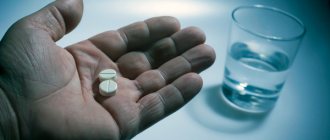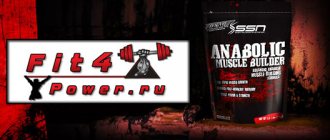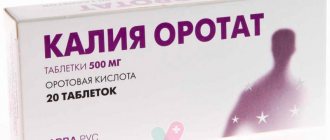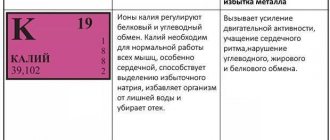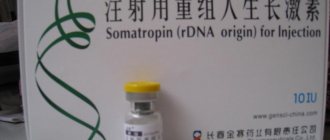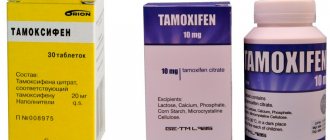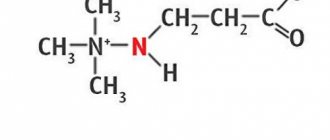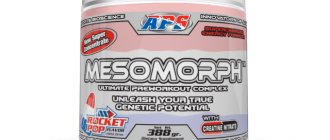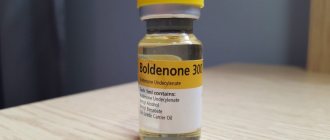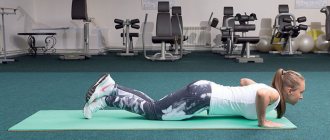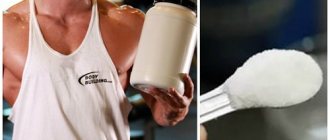Compound
1 tablet of the pharmaceutical product contains:
- Riboxin – 0.2 g;
- Calcium stearate;
- Potato starch;
- Powdered sugar;
- Opadry II Yellow coating mixture - Indigo carmine (E 132), Lactose monohydrate, Titanium dioxide (E 171), Macrogol (polyethylene glycol 3000), Quinoline yellow (E 104), Iron oxide (E 172).
Composition of solution for injection:
- Inosine – 20 mg/ml.
Release form
- 2% solution for injection in ampoules of 10 ml (total content of the main active ingredient – 200 mg). The cardboard box holds 10 ampoules.
- tablets are yellow, coated with a biconvex surface. In the cross section, two layers are clearly visible. The drug is packaged in contour cellular blisters made of aluminum foil or PVC, 10 tablets each. A pack contains 1, 2, 3, or 5 plates.
- Riboxin Lect - capsules containing Inosine - 0.2 g. 20, 30 or 50 pieces are placed in a cardboard package.
pharmachologic effect
What is Riboxin?
Riboxin is an anabolic that has nonspecific antihypoxic and antiarrhythmic effects. The main active component of the drug is Inosine (Inosine - INN or international nonproprietary name of pharmaceutical products) - a chemical precursor of adenosine triphosphate (ATP), which is directly involved in the metabolism of glucose and promotes the activation of metabolic processes in conditions of oxygen deficiency (“oxygen starvation”).
Mechanism of action of the drug
The biologically active substances included in the drug activate the metabolism of pyruvic acid (PVA), which ensures the normalization of tissue respiration even in the absence of the required amount of ATP. The active components also affect the enzymatic component of metabolic processes - when they enter the human body, they stimulate the activity of xanthine dehydrogenase , which in turn catalyzes oxidative reactions with the subsequent formation of uric acid from hypoxanthine.
The benefits and harms of Riboxin
The positive effects of the pharmaceutical drug include the effect of the main components of Riboxin on metabolism in the myocardium (heart muscle). Thus, the therapeutic properties of the drug are manifested in an increase in the energy balance of cardiomyocytes , accelerated formation of nucleotides, which manifests itself in enhanced processes of physiological regeneration of cardiac tissue. That is, the medicine helps to normalize the contractile activity of the myocardium and a more complete course of diastole, when the heart completely relaxes due to the ability to bind with chemical chains of calcium ions that penetrate into the intracellular space during systole.
The negative effects of Riboxin include a change in the physiological sequence of the metabolic cycle . That is, the active components of a pharmaceutical drug, coming from outside, make adjustments to metabolic processes. As a rule, qualified specialists try, if possible, not to interfere in this area of biochemistry of the human body, since therapeutic effects can cause very adverse consequences for the patient. However, in the presence of a pathological process that destructively affects the heart muscle (the vital “pump” of the circulatory system), a change in metabolism is necessary, because non-intervention will lead to a much worse outcome.
Wikipedia about Riboxin
The free encyclopedia of knowledge on the Internet also reveals some aspects of the pharmacological action of the drug. In particular, all the cardiac effects of the biologically active components that make up Riboxin are described. In addition, on the page about this medicine there is information about the effect on the cellular component of the blood coagulation system - Inosine reduces platelet aggregation, which reduces the risk of developing thrombosis and thromboembolism . The regenerative therapeutic properties of the pharmaceutical drug extend not only to the heart muscle, but also to the mucous membrane of the gastrointestinal tract.
Separately, it should be noted that Inosine pranobec s is a type of drug that has immunostimulating activity and a nonspecific antiviral effect. The drug suppresses such harmful pathogens as herpes simplex virus, CMV (cytomegalovirus), measles and T-cell lymphoma virus type 3, human enterocytopathogenic virus and many others. The mechanism of this action lies in the inhibition of ribonucleic acid and inhibition of the biological catalyst dihydropteroate synthetase, which manifests itself in the suppression of viral replication and increased production of interferons by lymphocytes that destroy pathological organisms.
What is the effect of the drug?
One of the drugs in the group of anabolic steroids is Riboxin. Its dosage is sufficient for adequate nonspecific antihypoxic and antiarrhythmic effects on the human body. The active component of the drug, inosine, is a precursor of adenosine triphosphate (ATP), which is a universal energy source for all biochemical processes in the structures of living organisms. That is why “Riboxin” (tablets or injections) influences the activation of nucleotide synthesis, stimulates metabolic processes in the myocardium of the heart and improves blood circulation in the coronary system. Inosine is involved in glucose metabolism and stimulates redox reactions. In hypoxia and the absence of ATP, it becomes a catalyst for metabolic processes. This drug also reduces aggregation, that is, sticking together, of platelets, but activates regenerative processes in the tissues of the myocardium and the mucous membrane of the gastrointestinal tract. Another functional purpose of inosine is the ability to prevent the consequences of intraoperative renal ischemia.
Pharmacodynamics and pharmacokinetics
When taken orally, Riboxin is well and almost completely absorbed from the gastrointestinal tract. When administered intravenously, the pharmaceutical drug is quickly distributed into tissues that need ATP. Regardless of the route of administration, unused active ingredients are metabolized in the liver, where the final stages of metabolic biochemical reactions take place. A small amount of Riboxin is excreted in urine, feces and bile.
Indications for use of Riboxin
Indications for use of Riboxin tablets:
- Complex treatment of coronary heart disease (angina pectoris, coronary insufficiency, condition after myocardial infarction);
- Intoxication with cardiac glycoside drugs;
- Cardiomyopathies of various origins;
- Myocarditis;
- Rheumatic, congenital and acquired heart defects;
- Cardiac arrhythmia;
- Myocardial dystrophy of infectious or endocrine origin (especially against the background of heavy physical exertion);
- Coronary atherosclerosis ;
- Nonspecific liver diseases ( hepatitis , fatty degeneration of the parenchymal organ, cirrhosis);
- Drug and alcohol liver damage;
- Urocoproporphyria;
- Prevention of a decrease in the number of leukocytes during irradiation;
- Peptic ulcer of the stomach and duodenum ;
- Open-angle glaucoma with normalized intraocular pressure.
Specific indications for the use of injections:
- Urgent pathological conditions of cardiac arrhythmia;
- Surgeries on an isolated kidney (as a means of pharmacological protection in case of temporary absence of blood circulation);
- Arrhythmias of unknown etiology in medicine;
- Acute radiation exposure to prevent the development of changes in the blood formula.
Side effects
As a rule, the medicine is well tolerated, only in isolated cases the following side effects are observed:
- Arterial hypotension;
- Increased levels of uric acid and its salts in the blood;
- Tachycardia;
- Itchy skin;
- General weakness;
- Exacerbation of gout;
- Urticaria of allergic origin;
- Redness of the skin.
Side effects of Riboxin
Inosine was originally invented to treat heart and liver diseases. Considering all the positive aspects, the drug has shortcomings that can cause more harm to the body than benefit. Side effects for a healthy adult are minimal, the drug is contraindicated in those who:
- Under 18 years of age.
- Suffering from gout.
- Suffering from kidney failure.
- Has individual intolerance to the drug, allergies if the dosage is not observed.
- Sick of hyperuricemia - the level of uric acid in the blood is higher than normal, the drug increases this indicator.
- You should not mix Riboxin with alcohol - they are not compatible, the reaction can be critical and cause complications.
Riboxin – protects the heart from overload, helps muscles absorb oxygen faster, and gives energy. According to reviews from athletes, the benefits of the drug are especially valuable during periods of intense training for weightlifters, powerlifters and bodybuilders. The medicine is inexpensive, has anabolic properties and a minimum number of side effects, and is not prohibited in sports.
Instructions for use of Riboxin (Method and dosage)
Riboxin tablets, instructions for use
Tablets are used orally , before meals. The dosage, as a rule, is set individually in view of the characteristics of the metabolism of the active components and indications for conservative therapy. However, there are certain general treatment regimens for this pharmaceutical drug, according to which the daily dose for adults and children over 12 years of age is 0.6-2.4 g per day. Sanitation begins with small dosages (about 0.6-0.8 g - 1 tablet 3-4 times a day), and then, if the medicine is well tolerated and has a beneficial effect on the body, the dose is gradually increased over 2-3 days .
The maximum amount of the drug taken is 2.4 g per day - 4 tablets 3 times per day. This dosage is achieved for 2 months of a course of conservative treatment, the entire duration of which, as a rule, lasts from 1 to 3 months and is adjusted taking into account individual indications for therapeutic intervention.
Separately, it should be noted how to take tablets for urocoproporphy , since the pathophysiology of this disease is associated with an increase in uric acid salts in biological fluids and secretions. Riboxin, in turn, accelerates the metabolism of urates, activating the enzymatic oxidation of hypoxanthine. Therefore, in order to avoid deposits and the formation of stones, the dosage of the drug is 0.8 g per day - 1 tablet 4 times a day and must be strictly observed during conservative treatment.
Riboxin injections, instructions for use
Slow drip parenteral administration or rapid jet injections , depending on individual indications and the urgency of the pathological condition. If the attending physician chooses injections, then first apply a minimum dosage of 200 mg of Riboxin (10 ml of 2% injection solution) once a day. In case of acute cardiac arrhythmias, a single injection of 200-400 mg of Inosine (10-20 ml of 2% solution) intravenously can be used.
The dosage of jet administration is increased only if the drug is well tolerated. The maximum amount of the drug can be 400 mg of Riboxin (two ampoules of a 2% solution) 1 or 2 times a day. The duration of the course is selected individually (according to the general protocol - 10-15 days).
If you use Riboxin intravenously (intravenously) , then before its administration, a 2% solution of the drug must be diluted in 5% glucose or hypotonic sodium chloride solution (concentration - 0.9%) to obtain 250 ml of medicinal liquid. The rate of administration is 40-60 drops per minute.
Instructions during pregnancy
Riboxin is used intravenously for pregnant women, because in this way its effects are revealed more fully. The dosage and duration of the course of conservative therapy is selected strictly individually in each individual case, based on the results of various clinical studies and the opinion of qualified specialists.
How to use Riboxin Lect?
The dosage and duration of treatment with this variation of the pharmaceutical drug do not differ from the generally accepted protocols for therapeutic care with Riboxin. However, the Lect form of the drug is not used as an emergency correction of dysfunction of the heart muscle or other organs, since its effects develop somewhat more slowly.
How to carry out drug therapy correctly?
When prescribing any drug for use, the specialist must tell the patient how to properly take the drug in a particular dosage form. The same applies to anabolic steroids with inosine. The answer to the question of how to take Riboxin - before or after meals - is clear: the drug in tablet form is taken before meals. But the doctor should prescribe the exact dosage after examination. The manufacturer recommends daily intake of anabolic steroids in a fairly wide range: from 0.6 to 2.4 grams per day for children over 12 years of age and adults. The dosage of the medicine indicated by the doctor is divided into 3-4 doses. Treatment with an anabolic drug most often begins with a minimum dose of 0.6-0.8 grams. If a person does not experience any side effects in such therapy, and is not allergic to the components of the drug, then the dose is increased in accordance with the need for a substance such as inosine established by the specialist. Treatment with Riboxin is carried out over a course lasting at least 1 month. Often such therapy is extended for 2-3 months, which is done only on the recommendation of the attending physician.
In certain situations, the doctor prescribes the use of Riboxin ampoules in therapy. Intramuscular injections are not given, since this drug is used only as intravenous injections or for parenteral administration. Acute cardiac arrhythmias require a single injection of 200-400 mg of the drug intravenously; in other cases, rapid jet injections are used at a rate of 40-60 drops per minute. Just as for the tablet form, for the solution it is recommended to use the initial minimum dose. If such injections are well tolerated by the patient, then the dosage is increased, with the maximum amount of the active component being 400 mg. The course of administration of the solution intravenously or parenterally is about 2 weeks. If the solution from ampoules is intended for intravenous administration, then it must first be mixed with a 5% glucose solution or with a 9% hypotonic sodium chloride solution in an amount sufficient to obtain 250 ml of medicinal liquid.
Interaction
The combined use of a drug with cardiac glycosides enhances the inotropic effect of the latter and prevents the development of such adverse consequences of drug treatment as the occurrence of arrhythmia, for which Riboxin is sometimes prescribed together with this group of pharmaceuticals.
Simultaneous use of Riboxin with anticoagulants such as heparin increases the duration of their therapeutic action.
The drug is completely incompatible with acids and alcohols , pyridoxine hydrochloride or vitamin B6 , since both chemical compounds are deactivated, salts of heavy metals , and plant alkaloids . The latter, when interacting with Riboxin, form insoluble and non-removable compounds due to the detachment of the alkaloid base.
special instructions
Riboxin in bodybuilding
The pharmaceutical drug is classified as a metabolic agent and biochemical stimulant, so the drug can be used to gain weight , improve physical performance and increase strength . Riboxin was actively used in sports back in the 70s. The following types of nutrition for bodybuilders are known, which are actively sold to this day:
- Premium Inosine;
- Ultimate nutrition;
- Inosine mega-pro;
- Inosine life extension;
- Cell-tech hardcore.
How to take Riboxin for bodybuilding?
In sports nutrition, a tablet form of the drug is used, which is administered orally before meals. The dosage ranges from 1.5 to 2.5 g per day. As for therapeutic purposes, the number of tablets taken should be gradually increased from a starting dosage of 0.6-0.8 g 3-4 times a day to 2.5 g. Riboxin for athletes should be used for 4 weeks to 1.5 -3 months.
To enhance the effect of the drug on the myocardium and reduce the period of mid-mountain and climatic adaptation, Potassium orotate and Riboxin can be used together. In this case, the dosage of the potassium salt of orotic acid is 0.25-0.5 g 2-3 times a day before meals (course duration is 15-30 days), and Riboxin is used according to the above scheme.
Riboxin in veterinary practice
The drug is non-specific in its pharmaceutical nature, therefore it can also be used in veterinary therapeutic practice. Often the drug is used for dogs to eliminate heart failure , treat myocarditis and endocarditis , improve the metabolic abilities of the muscular organ with myocardosis and heart defects , which are very common senile problems in animals.
How should animals take Riboxin?
As a rule, the drug is administered intramuscularly , because this is the most rational route of administration in veterinary practice. The dosage is 0.1-0.2 g of the drug per 10 kg of animal weight 3 times a day. The course of conservative treatment lasts about a month. Repeated prescriptions of Riboxin are possible for a more thorough correction of metabolism or elimination of deep degenerative changes.
Reviews
Alexey Mikhailovich Muranov, cardiologist (Kharkov) Modern medicine has at its disposal more effective means than Riboxin. The medicine is quite popular, has a low price and rarely occurs minor side effects, there are also few contraindications. Prescribed when no serious illness has been identified, often for the placebo effect.
Anatoly Vasilyevich Smirnov, Omsk, 60 years old Since childhood, he has been involved in weightlifting at a professional level. Coaches, with the permission of doctors, always prescribed Riboxin not only to me, but also to other athletes. It was believed that the drug greatly increases endurance. Personally, with constant training, I never noticed a clear effect from the medicine, but there were no side effects.
Svetlana, Belgorod, 48 years old A neighbor advised me to take Riboxin to support my heart activity. The medicine is popular, cheap, and accessible. Of course, I didn’t consult a doctor. I took one tablet three times a day before meals for a week. Then pale pink rashes appeared on the skin, which were very itchy. Doctors diagnosed a nettle rash, which was a side effect of the medication. As soon as I stopped taking it, the rash went away.
Riboxin during pregnancy (and lactation)
The pharmaceutical drug is actively prescribed during the most critical periods for a woman, which, as a rule, plunges expectant mothers into slight bewilderment. Even after reading the instructions, many questions remain, the main one of which, of course, is what Riboxin is for during pregnancy. The drug improves energy supply and tissue metabolism , that is, it provides the woman and fetus with a more active supply of beneficial nutrients during the period when they suffer from deficient conditions. This is one of the main aspects of using Riboxin.
Also, the active ingredients help reduce harm from the so-called “ oxygen starvation ,” which is a common complication during pregnancy. A pathological condition occurs because the woman’s respiratory system supplies two organisms with vital gas. But such a powerful need for oxygen runs counter to the capabilities of the lungs and bronchial tree. Therefore, the antihypoxic effect of Riboxin comes in handy, and this is the second, but no less important aspect of using the drug during pregnancy.
Among the therapeutic properties of a pharmaceutical drug, a significant part consists of effects on cardiac activity . Riboxin normalizes myocardial contractile activity, regulates the metabolic needs of cardiomyocytes, and helps enhance trophic processes. Thus, the drug plays the role of preventive sanitation , since it is not uncommon for pregnant women to develop pathological processes such as arrhythmias, tachycardias and other disturbances in the rhythm of the heart muscle.
How to take Riboxin for pregnant women?
The dosage and duration of use of a pharmaceutical drug during pregnancy is always selected individually based on diagnostic test results, ultrasound data and other physiological parameters. As a rule, Riboxin is administered intravenously during pregnancy, but in the medical literature and on thematic forums for pregnant women, cases of prescribing the tablet form of the drug are described.
The use of Riboxin in bodybuilding
Understanding the benefits of the additional energy that Riboxin brings to the body has led to its widespread use in strength sports that require high energy consumption. The use of the drug allows:
- Increase the concentration of hemoglobin in the blood to the optimal value, taking into account the throughput of the substance.
- Stimulate the production of insulin by the pancreas, which ensures easy absorption of carbohydrates by the myocardium.
- Adjust the lumen of blood vessels depending on the voltage, increasing it.
- Activate immunity.
- Accelerate muscle regeneration.
- Increase the athlete's endurance level.
All this, especially endurance, is invaluable for bodybuilding. In addition, Riboxin improves blood supply to all organs, including those responsible for potency, which is important for men.
The multi-vector nature of the drug allows you to completely reduce energy costs when performing strength exercises, guaranteeing normal oxygen supply, and, therefore, breathing and tissue nutrition, that is, metabolism.
At the same time, one should not forget about a sense of proportion and caution. That is, before using Riboxin, a complete clinical and laboratory examination is indicated in order to assess the condition of the body and its need for the drug. Athletes using Riboxin easily tolerate physiological hypoxia, since tissue cells absorb oxygen as much as possible. At the same time, the myocardium works calmly and confidently.
Reviews about Riboxin
Reviews about Riboxin characterize the drug from a positive point of view in their overwhelming majority. The drug has an extremely small list of possible side effects, which seems even more insignificant if we consider the entire range of indications for the use of Riboxin. The active components make it possible to effectively fight and stop the pathological effects of most common nosological entities affecting the vital circulatory system and its “main pump”.
However, the therapeutic effects of the drug are not limited to effects on the myocardium. The active ingredients promote active regeneration of the mucous membrane in case of destructive diseases of the gastrointestinal tract, and how often in the modern world do you meet a person without at least a mild form of gastritis? The positive effects also extend to the blood system, metabolic processes in the kidneys and other organs and systems.
Reviews from doctors only confirm the favorable therapeutic capabilities of the pharmaceutical drug. Of course, there are those in the medical community who postulate very dubious harmful aspects of using Riboxin, but the vast majority of qualified specialists express their “for” and universally prescribe the drug in the fight against various pathological conditions.
Reviews of this pharmaceutical drug from athletes and bodybuilders are negative. To gain weight and improve physical performance, Riboxin was used back in the 70s, after which biochemistry stepped far forward and reliably proved that the active components do not have an anabolic effect on muscle mass. Accordingly, a course of taking the drug can help only in the form of the so-called “placebo” effect. Athletes, calculating their results, notice the lack of influence and therefore scribble unpleasantly colored reviews left and right.
The situation changes in the opposite direction when it comes to the use of Riboxin during pregnancy. During a course of therapy with a pharmaceutical drug, the negative consequences of a critical condition are more easily tolerated, since the adaptive abilities of the body are significantly expanded due to the properties of the active components. The trophism of tissues and organs has also been improved, so the color and nature of the skin and the functioning of individual systems do not become a cause for concern. Based on the majority of positive reviews, we can safely say that pregnancy is much easier with Riboxin.
Use during pregnancy and breastfeeding
Riboxin is quite often prescribed to women during pregnancy. This is due to the fact that the drug has a positive effect on the body of the expectant mother and helps regulate the processes occurring during the formation of the fetus. Reviews about the medicine are in most cases positive.
Indications for use during pregnancy are the following conditions:
- tachycardia, arrhythmia;
- interruptions in myocardial function;
- severe toxicosis;
- oxygen starvation that occurs for various reasons;
- chronic gastritis in pregnant women;
- kidney pathologies.
Riboxin during pregnancy is allowed to be taken under the strict supervision of a leading doctor, otherwise the consequences can be very negative. How many days to take the medicine and what dose of the drug depends on the woman’s condition and her individual characteristics.
Riboxin price, where to buy
The pharmaceutical drug can be purchased almost everywhere at pharmacy kiosks throughout the Russian Federation. The price of Riboxin tablets is 20 rubles, and the price of Riboxin in ampoules is 80 rubles per package.
You can buy the medicine in other countries, for example, the price of Riboxin in Ukraine for the tablet form fluctuates on average about 10-11 hryvnia, and a solution for injection or infusion can be purchased for 40-50 hryvnia.
- Online pharmacies in RussiaRussia
- Online pharmacies in UkraineUkraine
- Online pharmacies in KazakhstanKazakhstan
ZdravCity
- Riboxin-solopharm politvist solution for intravenous injection.
2% 5ml amp. plastic. No. 10 LLC "Grotex" 79 rub. order - Riboxin tablets p.p.o. 200 mg 50 pcs. Avexima LLC Avexima Siberia
89 rub. order
- Riboxin solution for intravenous injection. 20mg/ml amp. 5ml 10 pcs. Biosynthesis JSC
46 RUR order
- Riboxin solution for intravenous injection. 20mg/ml amp. 5ml 10 pcs. Welfarm LLC
135 rub. order
- Riboxin solution for intravenous injection. 2% 10ml 10 pcs. JSC Dalkhimfarm
80 rub. order
Pharmacy Dialogue
- Riboxin Bufus (amp. 2% 5ml No. 10)Update PFC JSC
87 RUR order
- Riboxin (tablet p/o 200 mg No. 50) BZMP
45 rub. order
- Riboxin (amp. 2% 5ml No. 10) DHF JSC
49 RUR order
- Riboxin (amp. 2% 10ml No. 10) DHF JSC
57 RUR order
- Riboxin (tablet p/o 200 mg No. 50) Ozone LLC
72 RUR order
show more
Pharmacy24
- Riboxin No. 50 tablets PrAT "Tekhnolog", Uman, Cherkasy region, Ukraine
14 UAH. order - Riboxin 2% 10 ml N10 injection solution PAT "Galichfarm", Ukraine
34 UAH order
- Riboxin-Darnitsa 2% 5 ml No. 10 solution PrAT" Pharmaceutical company "Darnitsa", Ukraine
22 UAH order
- Riboxin 2% 20 mg/ml 5 ml N10 injection solution PAT "Galichfarm", Ukraine
25 UAH order
- Riboxin-Darnitsa 2% 10 ml No. 10 solution PrAT" Pharmaceutical company "Darnitsa", Ukraine
30 UAH order
PaniPharmacy
- Riboxin ampoule Riboxin solution d/in. 2% amp. 10ml No. 10 Ukraine, Darnitsa ChAO
37 UAH order
- Riboxin ampoule Riboxin solution d/in. 2% amp. 10ml No. 10 Ukraine, Galichfarm JSC
29 UAH order
- Riboxin tablets Riboxin tablets. p/o 0.2g No. 50 Ukraine, Tekhnolog ChAO
17 UAH order
- Riboxin tablets Riboxin tablets. p/o 0.2g No. 50 Ukraine, Darnitsa ChAO
20 UAH order
- Riboxin ampoule Riboxin solution d/in. 2% amp. 5ml No. 10 Ukraine, Darnitsa ChAO
25 UAH order
show more
